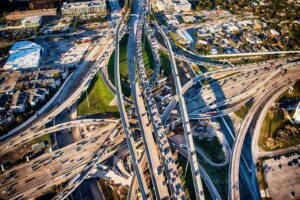From Mental Hellth: “I have always felt, on a deeply instinctual level, that cars represent a form of collective insanity, a terrifying and dangerous rush away from the natural order of things which can only be detrimental to our mental health.
When I tell people about my car-reticence, they generally assume that my areas of concern are physical—road safety and environmental pollution. I do worry about these things, of course, and with good reason. The number of deaths caused by road accidents, globally, stands at around 1.3 million per year, with traffic pollution twice as deadly.
My personal unease, though, stems from a deeper place—an almost primal feeling which overwhelms me at the thought of racing traffic and endless stretches of concrete. Those stretches are considerable. Globally, there exist an estimated 40 million miles of road, and every inch of that concrete has displaced an inch of nature . . .
My driving friends are quick to acknowledge their environmental concerns, and their desire to switch to electric vehicles, but the problem with cars runs much deeper: cars, and the infrastructure needed to sustain them, quite literally represent a separation between humankind and the natural environment. Our reliance on vehicles, highways and concrete strips us of our innate connection to our environs. Humans, we are saying, are no longer a part of the ecosphere.
Psychologists, philosophers and environmentalists have long been aware of the deep-rooted problems that result from our disconnection from nature. In a fascinating interview for Womankind, celebrated primatologist Dr. Jane Goodall observed, ‘We are divorced from nature in a disastrous way, seeming not to realize that if we continue living like this we shall end up destroying ourselves. Moreover, we need to connect to nature for our spiritual health. This is particularly true for children.’
An Australian study in 2014 concluded that, ‘longer driving time was associated with higher odds for smoking, insufficient physical activity, short sleep, obesity, and worse physical and mental health.’ Studies elsewhere show that driving more than ten miles each day results in higher blood sugar levels, higher cholesterol, increased blood pressure and lack of sleep. On the flip side, cycling or walking results in a proven boost for both the mind and the spirit. A remarkable piece of research undertaken in Denmark shows of 20,000 children studied, between the ages of 5 and 19, those who cycled or walked to school displayed a measurable and lasting increase in concentration. There exists plenty of further evidence that cycling, in particular, does much to combat cognitive decline and depression.
Perhaps the roots of my anxiety towards cars lie in separation. Behind layers of plastic and metal, surrounded by tarmac, buildings and other artificially-encased individuals, I feel isolated in an unnatural world of harsh, cold textures. Humans and nature should not be divided. Driving man-made vehicles through artificially-made landscapes, it seems to me, does indeed display a form of shared madness, or more properly a delusion. A delusion which asks us to believe, in spite of all evidence, that the transport networks we have built and the vehicles we use are a good thing.
The dominant belief is that cars form a welcome and irreplaceable part of modern life, that their convenience benefits us as individuals and as a society, and that those benefits outweigh any negative effects. What advantages, though, do they really bring? Without individual vehicles we would work closer to our homes, local shops and services would thrive and public transport would improve radically. This is called community.
At the age of 45 I had several driving lessons. In the end, I gave up. The experience did nothing to change my long-held suspicions that these rampaging chunks of metal do not enrich our lives. In fact, it was something of a relief to let go of my internal struggle . . . There is plenty of evidence out there to show that our overwhelming reliance on cars, quite apart from their environmental impact, is severely damaging to our mental and spiritual selves.”
***
Back to Around the Web












